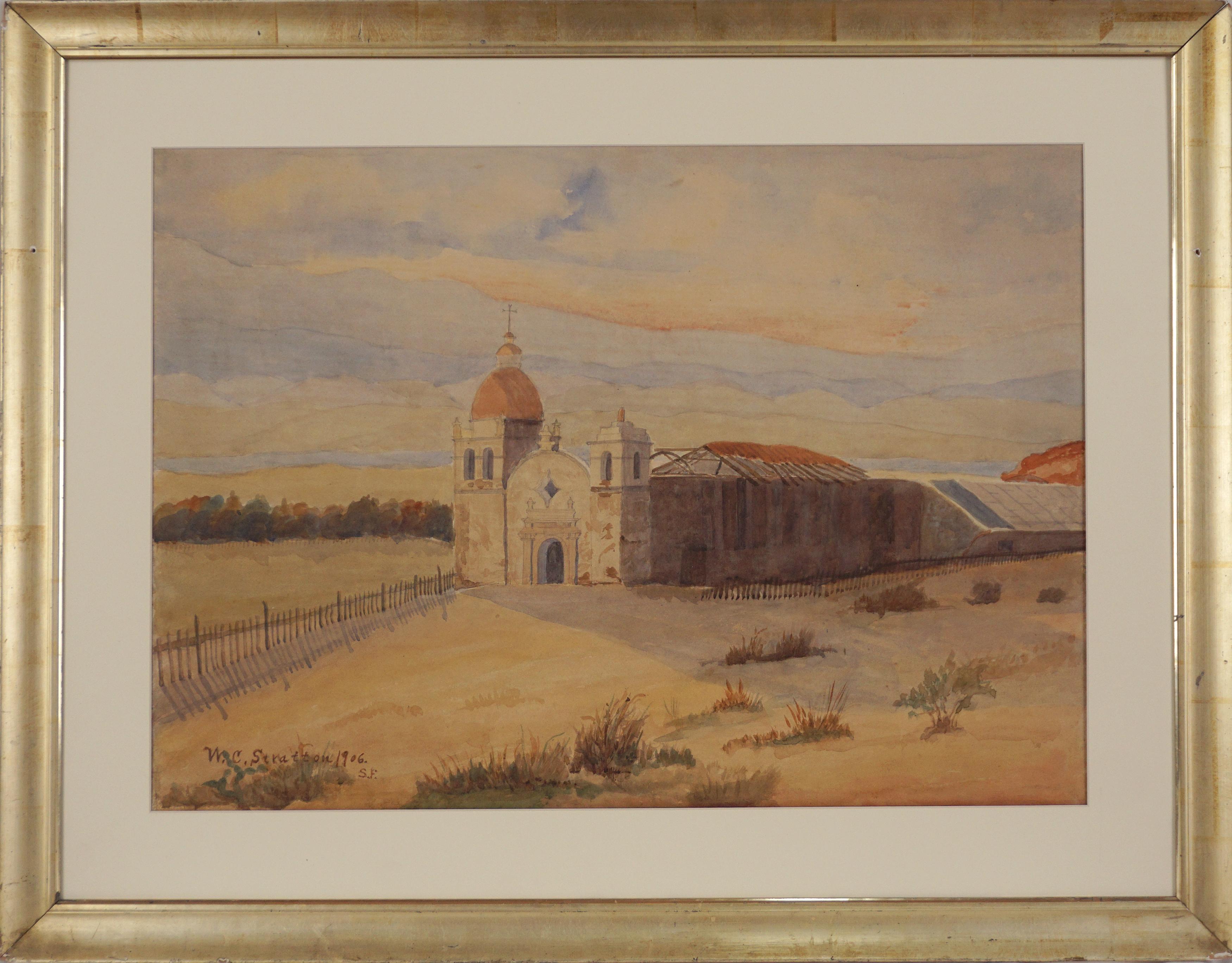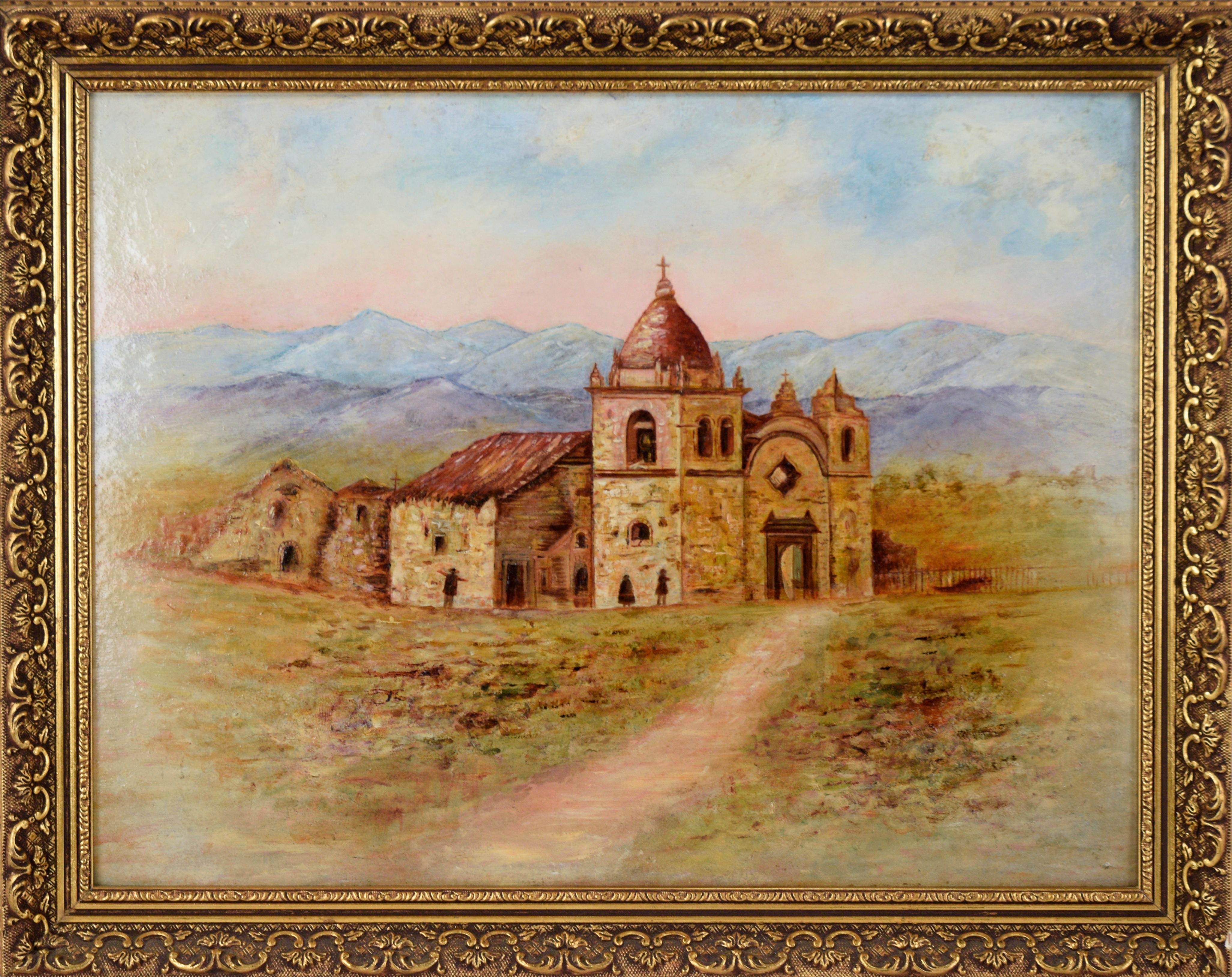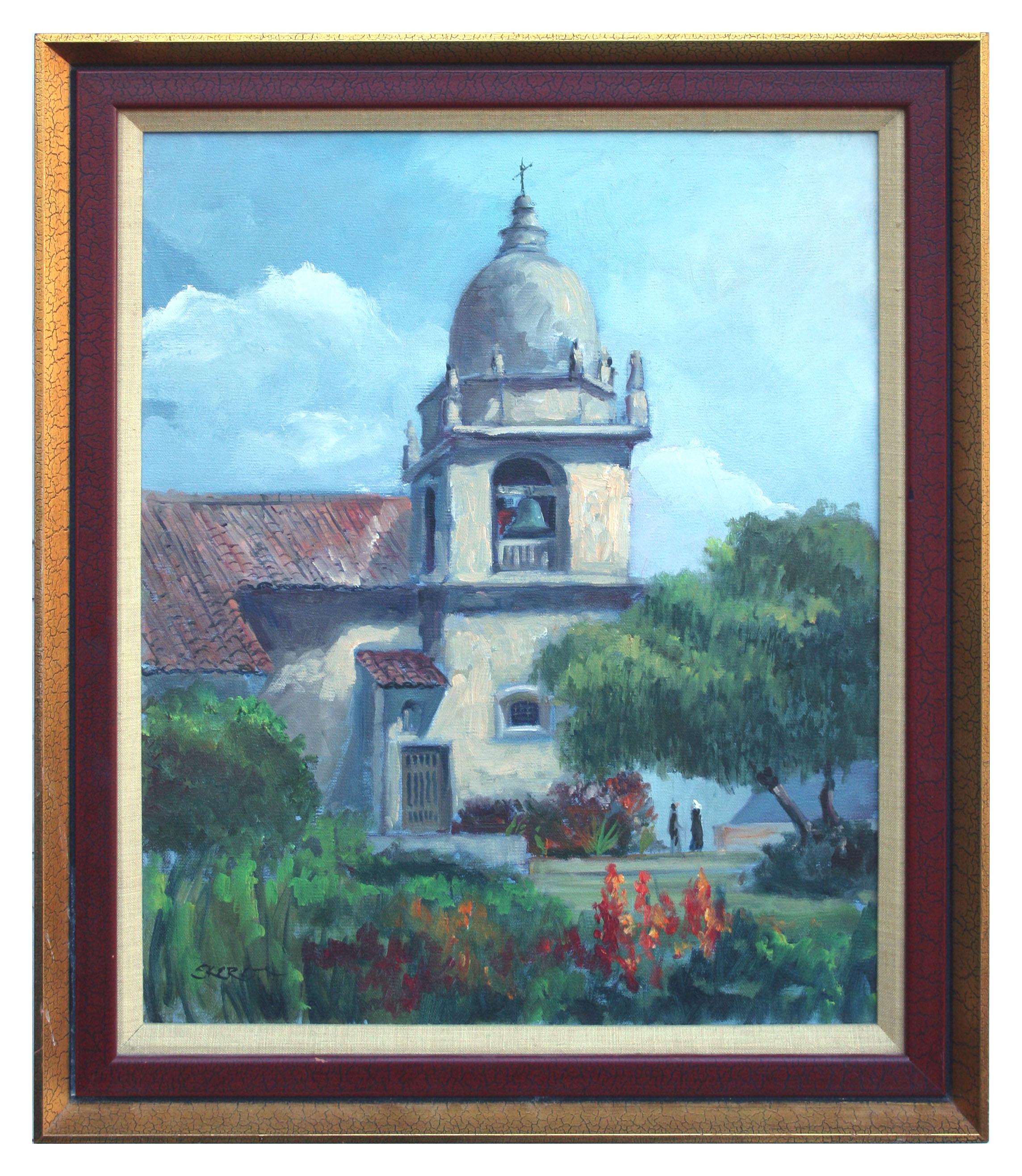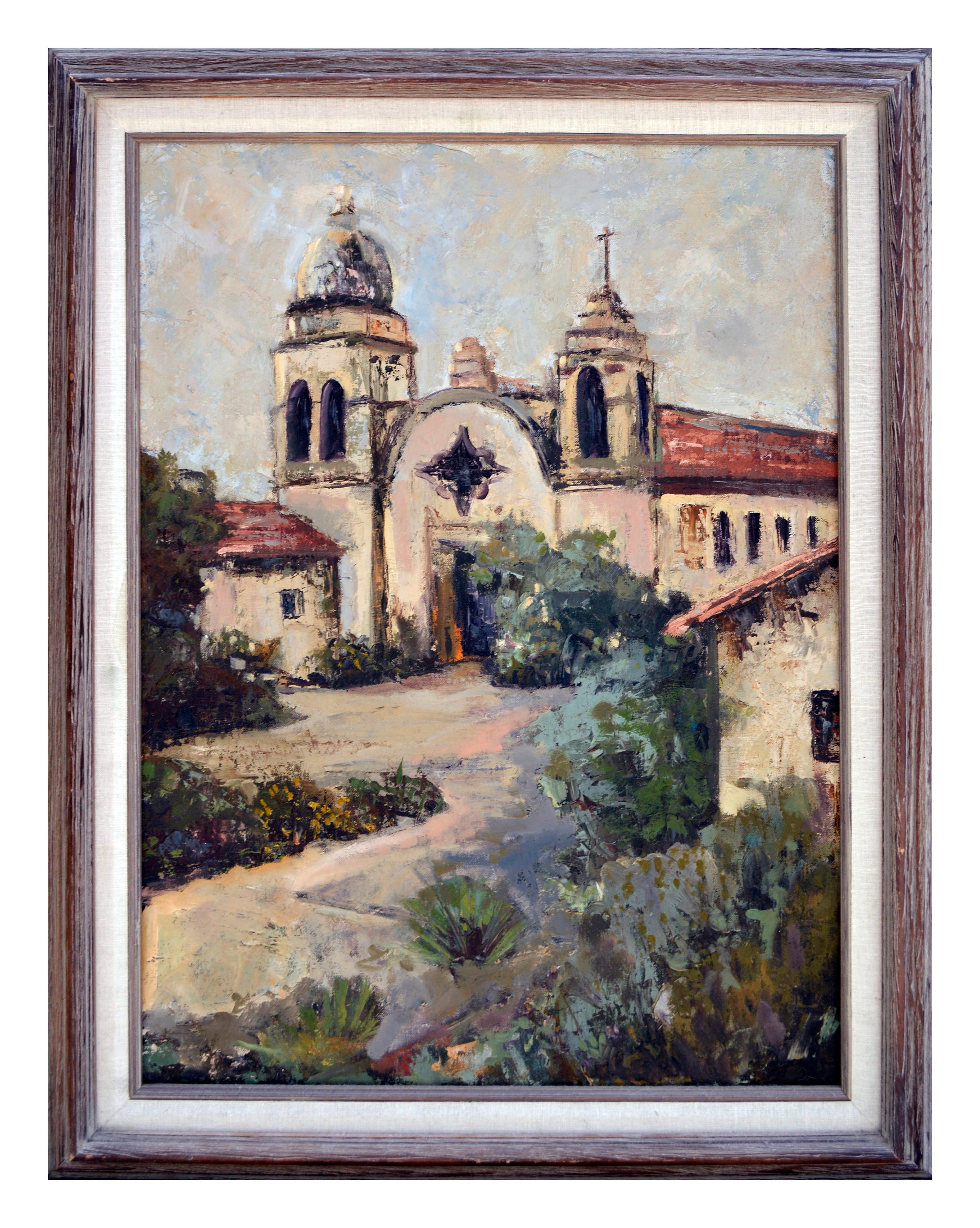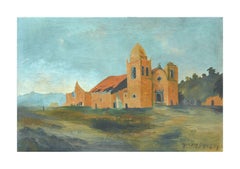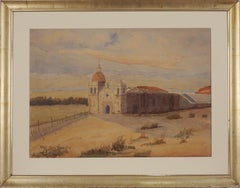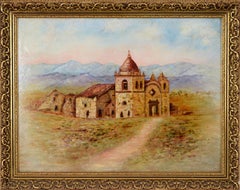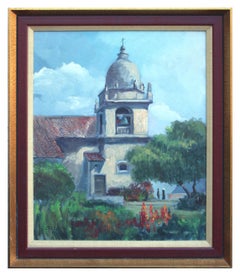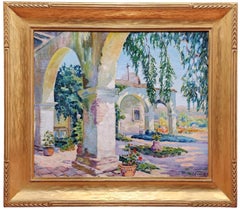Items Similar to 1890s Mission San Carlos Borromeo de Carmelo, Carmel Landscape
Want more images or videos?
Request additional images or videos from the seller
1 of 9
George Hamilton Brodhead1890s Mission San Carlos Borromeo de Carmelo, Carmel Landscape1890
1890
$1,350
£1,024.35
€1,171.25
CA$1,885.58
A$2,096.51
CHF 1,094.68
MX$25,519.67
NOK 13,967.68
SEK 13,087.05
DKK 8,741.26
Shipping
Retrieving quote...The 1stDibs Promise:
Authenticity Guarantee,
Money-Back Guarantee,
24-Hour Cancellation
About the Item
Late 19th century watercolor of the Mission San Carlos Borromeo de Carmelo, in Carmel CA, by George H. Brodhead (American, b. 1860). Signed "G.H. Brodhead" in the lower right corner. Presented in an vintage gold and white frame with a new mat. Image size: 7.25"H x 10.25"W
George Hamilton Brodhead (American, b. 1860) was born in Boston, Massachusetts, and was a member of the Boston Art Club. Brodhead also lived in New York, where he joined the Rochester Art Club and later opened The Brodhead Gallery on East Avenue. Brodhead’s work is a part of a collection at the Smithsonian American Art Museum in the Renwick Gallery.
- Creator:George Hamilton Brodhead (1860)
- Creation Year:1890
- Dimensions:Height: 17 in (43.18 cm)Width: 22.75 in (57.79 cm)Depth: 1.13 in (2.88 cm)
- Medium:
- Movement & Style:
- Period:
- Condition:This piece has been professionally restored to minimize tonal ageing and PH balance and acid free.
- Gallery Location:Soquel, CA
- Reference Number:Seller: JT-DBH53811stDibs: LU5424378552
About the Seller
5.0
Platinum Seller
Premium sellers with a 4.7+ rating and 24-hour response times
Established in 1986
1stDibs seller since 2014
2,960 sales on 1stDibs
Typical response time: <1 hour
- ShippingRetrieving quote...Shipping from: Soquel, CA
- Return Policy
Authenticity Guarantee
In the unlikely event there’s an issue with an item’s authenticity, contact us within 1 year for a full refund. DetailsMoney-Back Guarantee
If your item is not as described, is damaged in transit, or does not arrive, contact us within 7 days for a full refund. Details24-Hour Cancellation
You have a 24-hour grace period in which to reconsider your purchase, with no questions asked.Vetted Professional Sellers
Our world-class sellers must adhere to strict standards for service and quality, maintaining the integrity of our listings.Price-Match Guarantee
If you find that a seller listed the same item for a lower price elsewhere, we’ll match it.Trusted Global Delivery
Our best-in-class carrier network provides specialized shipping options worldwide, including custom delivery.More From This Seller
View AllEarly 20th Century Carmel Mission Landscape
Located in Soquel, CA
Early 20th Century Carmel Mission Landscape
Vibrant early 20th Century painting of Mission San Carlos Borromeo del río Carmelo, aka Carmel Mission, pr...
Category
1920s American Impressionist Landscape Paintings
Materials
Canvas, Oil
Early 20th Century Mission Carmel, California Watercolor.
Located in Soquel, CA
1906 Original Watercolor Painting of Mision de San Carlos Borromeo de Carmelo (Mission Carmel)
Historically accurate watercolor painting of Carmel historic landmark Mission Carmel i...
Category
Early 1900s Impressionist Landscape Paintings
Materials
Watercolor, Laid Paper, Pencil
Carmel Mission, 1870 - California School Landscape Oil Painting
Located in Soquel, CA
Carmel Mission, 1870 - Landscape Oil Painting
One of California's Mission settlements lies on the Central Coast in Carmel, depicted in this landscape oil painting. The Spanish architecture...
Category
20th Century American Impressionist Landscape Paintings
Materials
Oil, Board
Mid Century Carmel Mission Landscape by Elmer Ekeroth
Located in Soquel, CA
Mid Century Carmel Mission Landscape by Elmer Ekeroth
Wonderful landscape of the historic bell tower of the Carmel Mission with background of dynamic ...
Category
1980s American Impressionist Landscape Paintings
Materials
Canvas, Oil
Vintage California Landscape of Carmel Mission
Located in Soquel, CA
Beautiful vintage California landscape of Carmel Mission with native plants in soft neutrals and subtle muted colors by Kathleen J. Canepa (American, 20...
Category
1970s American Impressionist Landscape Paintings
Materials
Canvas, Oil, Cardboard
$680 Sale Price
20% Off
Carmel Mission Watercolor Landscape
By Deanna DeChauron
Located in Soquel, CA
Carmel Mission by Deanna DeChauron a Carmel based artist. Watercolor painting of the Old Carmel Mission located near the coast in the Village of Carmel,...
Category
1990s American Impressionist Landscape Paintings
Materials
Paper, Watercolor
You May Also Like
Mission San Carlos Borromeo de Carmelo, Carmel, California
Located in San Francisco, CA
This artwork Titled "Mission San Carlos Borromeo de Carmelo, Carmel, California" c.1970, is a large watercolor on heavy Arches watercolor paper by Carmel impressionist artist Edward ...
Category
Late 20th Century American Impressionist Figurative Drawings and Waterco...
Materials
Watercolor
San Carlos, Borromeo Del Carmelo
By Jane Burnham
Located in San Francisco, CA
This artwork "San Carlos, Borromeo Del Carmelo" c.1970 is a watercolor on paper by American impressionist artist Jane Burnham, 1926-2016. It is signed at ...
Category
Late 20th Century American Impressionist Landscape Drawings and Watercolors
Materials
Watercolor
Carmel Mission Basilica
By Jeanne A. Ocker
Located in San Francisco, CA
This artwork titled "Carmel Mission Basilica" is a watercolor on paper by noted California artist Jeanne Ocker, born 1922. It is signed and dated at the...
Category
Late 20th Century American Impressionist Figurative Drawings and Waterco...
Materials
Watercolor
Mission San Juan Capistrano, American Impressionist, Mathias Alten, California
Located in Grand Rapids, MI
Foster Jewell (American, 1893-1984)
Signed: F. Jewell (Lower, Right)
" Mission San Juan Capistrano ", circa 1934
Oil on Canvas
21" x 25"
Beautifully housed in a 4" Carved Frame ...
Category
Early 20th Century American Impressionist Landscape Paintings
Materials
Canvas, Oil
'Carmel Mission', Santa Clara, California, Society Western Artists, Historical
By Henry Hank Volle
Located in Santa Cruz, CA
Signed lower right, 'Henry Volle' (American, 20th century) and painted circa 1975.
A substantial and lyrically painted watercolor view of the original Spanish colonial church and mission buildings at Carmel on the coast of California with a view beyond towards the Carmel highlands.
Henry "Hank" Volle first attended the University of Illinois and subsequently studied in Europe, including at the Klinger Institute, Vienna. Upon returning to the United States, Volle began to study with the water-colorists of the California Bay area. Essentially a plein-air painter, Hank Volle painted along the California coast where he exhibited with success. He was also a member of the Santa Clara Watercolor Society and the Society of Western Artists.
Category
1970s Post-Impressionist Landscape Drawings and Watercolors
Materials
Watercolor, Laid Paper
"MISSION SAN JUAN CAPISTRANO" SAN ANTONIO TEXAS 44 X 56 FRAME SIZE TEXAS ARTIST
By Al Barnes
Located in San Antonio, TX
Al Barnes
(1937-2017)
Cuero / Rockport Artist
Image Size: 36 x 48
Frame Size: 44 x 56
Medium: Oil on Canvas
"Mission San Juan Capistrano" San Antonio Mission
Biography
Al Barnes (1937-2017)
IN MEMORIAM:
AL BARNES (1937-2015) ROCKPORT, TX. Rockport Center for the Arts mourns the loss of Al Barnes, who passed away Thursday, November 12th, 2015, at his hill country home outside Johnson City.
Barnes was born in Cuero, Texas in 1937. His artistic course was set when he moved to Port Isabel when he was an elementary school student. He became enchanted with nautical life when a local ferry captain allowed him to freely ride and steer the vessel back and forth between South Padre Island and the mainland. He sold his first painting in the sixth grade, using watercraft and coastal waters as inspiration in early works.
Barnes fulfilled his desire to become a professional artist, earning a Bachelor of Fine Arts degree in 1967 from the University of Texas at Austin. After graduation and marriage, he relocated to Dallas, where he worked as an illustrator, freelancer, and art director for thirteen years. After completing a large mural commission, Barnes was ready for a change. The tide pulled him back to the coast.
He nourished his ongoing fascination with the waterfront as a crew member on boats traveling from New England to the Caribbean, Texas to Florida, and Florida to Belize. The clear turquoise waters of the Caribbean and native boats were common themes in many of his works. Informed by his early influences, much of his work originated in his urge to paint water. In a 1977 interview Barnes said, “The different landscapes and people on the coast have always been in my paintings and always will.” Barnes preferred beginning with the ocean or a landscape, allowing the subject to insert itself into the composition. Birds and boats worked themselves into picture plane in uniquely natural ways.
Barnes’ artistry and talents were nationally recognized, but while he was inspired by the Caribbean, he felt more at home in the coastal marshes of South Texas. Barnes called Rockport-Fulton home for over forty years. In 1995 Rockport Center for the Arts selected him as the Art Festival poster...
Category
1980s Impressionist Landscape Paintings
Materials
Oil
More Ways To Browse
Mission Painting
The Hamilton Collection
George Hamilton
George Carmel
George Hamilton Paintings
Carmel Mission
Large French Painting
Small Landscape Painting
Public Sculpture
Black And Gold Frame
Antique Signed Oil Painting
French Oil Paintings With Frame
American Lithographs
Landscape Paintings With Sky
Pop Art Signed Print
Vintage Art Times
Bright Contemporary Art
Painting Of Spring

